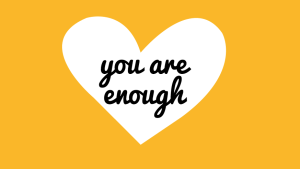Self-Compassion: Here’s Why Science Says We Need More of It
Created by Happify. Science-based activities and games for a happier, healthier life at Happify.com
Self-Compassion Leads to Happiness
A fail-safe way to increase your well-being is to practice self-compassion.
Studies show that people who have compassion for themselves are:
- happier
- more optimistic
- more grateful
…than those who are harder on themselves.
What Is Self-Compassion, Anyway?
It has three main elements:
1. Self-kindness. Being supportive and gentle to oneself.
2. Understanding common humanity. All humans are imperfect and make mistakes!
3. Mindfulness. Being aware of one’s suffering with clarity.
If Self-Compassion Is So Great, Why Don’t We See More of It?
We confuse it with: self-pity, self-indulgence, making excuses for bad behavior.
In fact, self-compassion involves taking responsibility for our behavior – even when it’s bad – and accepting ourselves as human. This allows us to see things clearly and change our behavior so we don’t stagnate, but rather make progress toward our goals.
How Else Does Self-Compassion Help?
Self-compassion breads resilience. Those who have it suffer less and are better able to reach their full potential.
It’s not all about you. People who are compassionate toward themselves are better able to forgive others, too.
Are You Too Self-Critical?
Research finds that people who are self-critical are:
- At higher risk for depression and stress
- Less effective at implementing coping strategies
5 Tell-Tale Signs You May Want to Work on Boosting Your Self-Compassion:
1. Nothing is ever good enough
2. Your way is always the right way
3. You ruminate repeatedly over your missteps
4. You see things as black or white, with no gray
5. You have an intense fear of failure
Here’s how to work on being less self-critical, from self-compassion researcher Kristin Neff, Ph.D.:
Step 1: Notice how you talk to yourself. What’s your tone of voice, even if it’s inside your head?
For example: “You turned down that public speaking opportunity because you’re a chicken. You’ll never get ahead.” “You’re not good enough.”
Step 2: Say to your critical voice, “I know you’re disappointed, but you are causing me pain.”
Step 3: Now reframe the criticism.
“You let your nervousness get the best of you. I know you can do this. Let’s take a long walk and strategize how to accept and fulfill the next speaking invitation.” “It will happen next time!”
Step 4: It might sound weird, but it can even help to stroke your arm. Just acting kindly (even if you don’t feel it) can help with the transformation.
Be Kinder to Yourself
Here’s another exercise from the research of Kristin Neff, Ph.D.:
Think of a difficult situation. Feel the stress in your body.
Say to yourself, “This is stress” or “This is suffering.”
Then, “Everyone suffers.”
Now put your hands over your heart and feel the warmth of your hands.
Then say to yourself: “Let me accept myself as I am.”
Adopt the phrases so they work for you. Use this any time, anywhere!
Flexibility Is Your Friend!
People who are able to change their plans or their outlook can more easily increase their self-compassion as well as diminish their levels of stress, depression, and anxiety.
Other practices that have been found to increase self-compassion:
- Mindfulness meditation
- Body awareness. Exercises such as lying on the ground and tensing and relaxing each body part from feet to head, or simply feeling your feet on the ground when you are stressed.
- Yoga
Self-Compassion > Self-Esteem
Researchers find that self-compassion brings about more constant feelings of self-worth than does self-esteem.
That’s because self-esteem may depend on comparing yourself favorably to others (and putting them down), while self-compassion is an intrinsic acceptance of yourself.
Help Through Life’s Rough Patches
If you’re going through a breakup or divorce, self-compassion can increase your ability to bounce back, and shorten recovery time.
Women who accept their physical imperfections have a more positive body image, no matter their BMI (body mass index).
Women with greater self-compassion are less likely to have an eating disorder.
Gay men who showed self-compassion felt more satisfied with their lives, despite being at risk for bullying and other types of mistreatment.
Veterans who practiced self-compassion and mindfulness were more functional overall and were less likely to be mentally ill.
Did You Know?
People who accept their personal failures are more likely to take steps to improve themselves.
“The curious paradox is that when I accept myself just as I am, then I can change.” —Carl Rogers





















